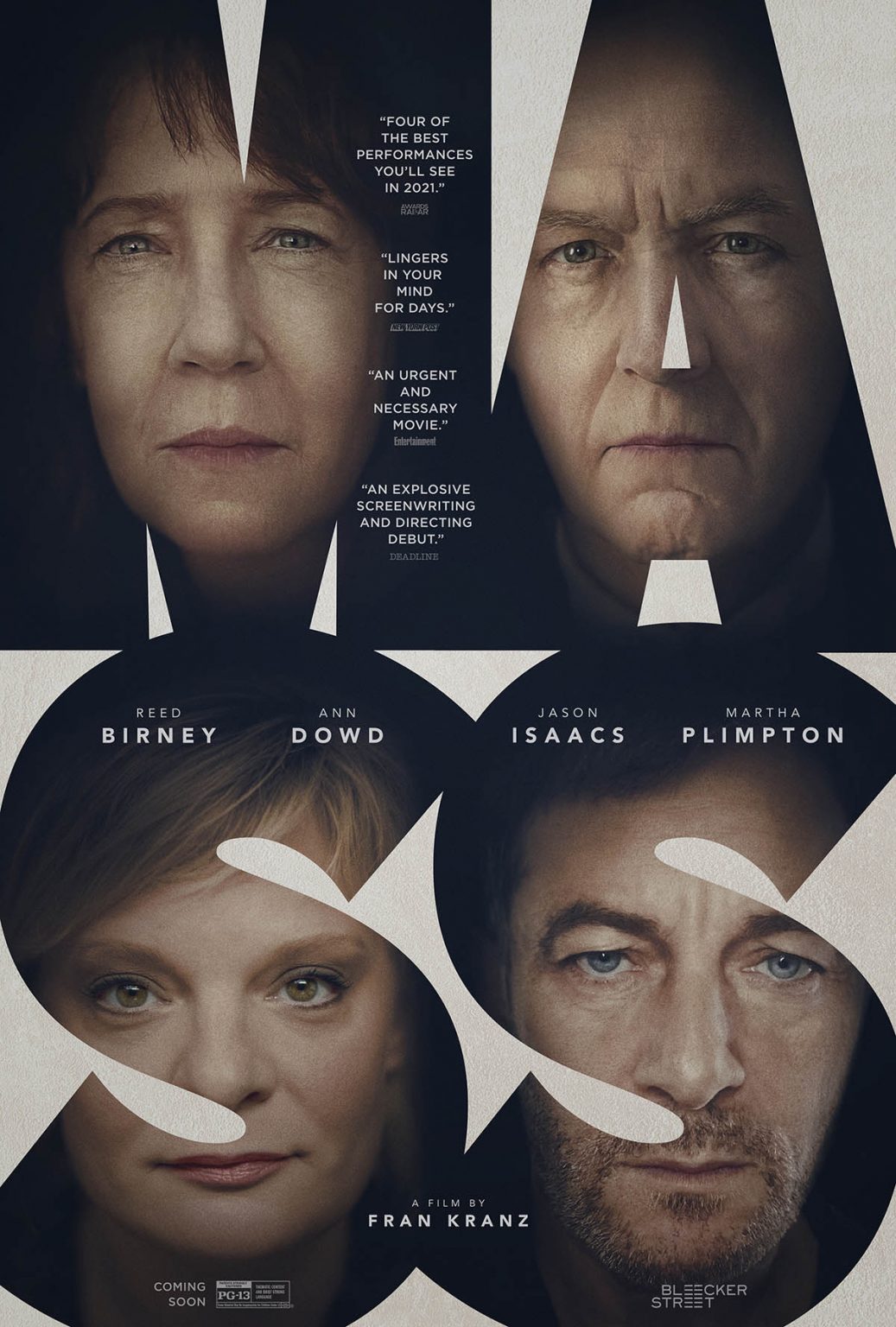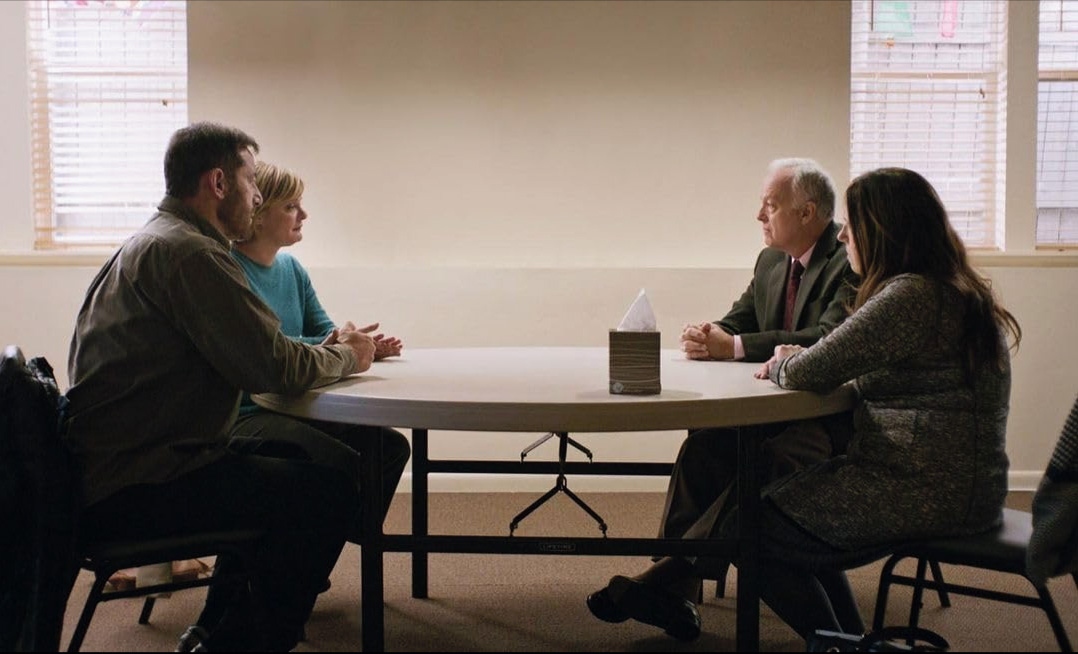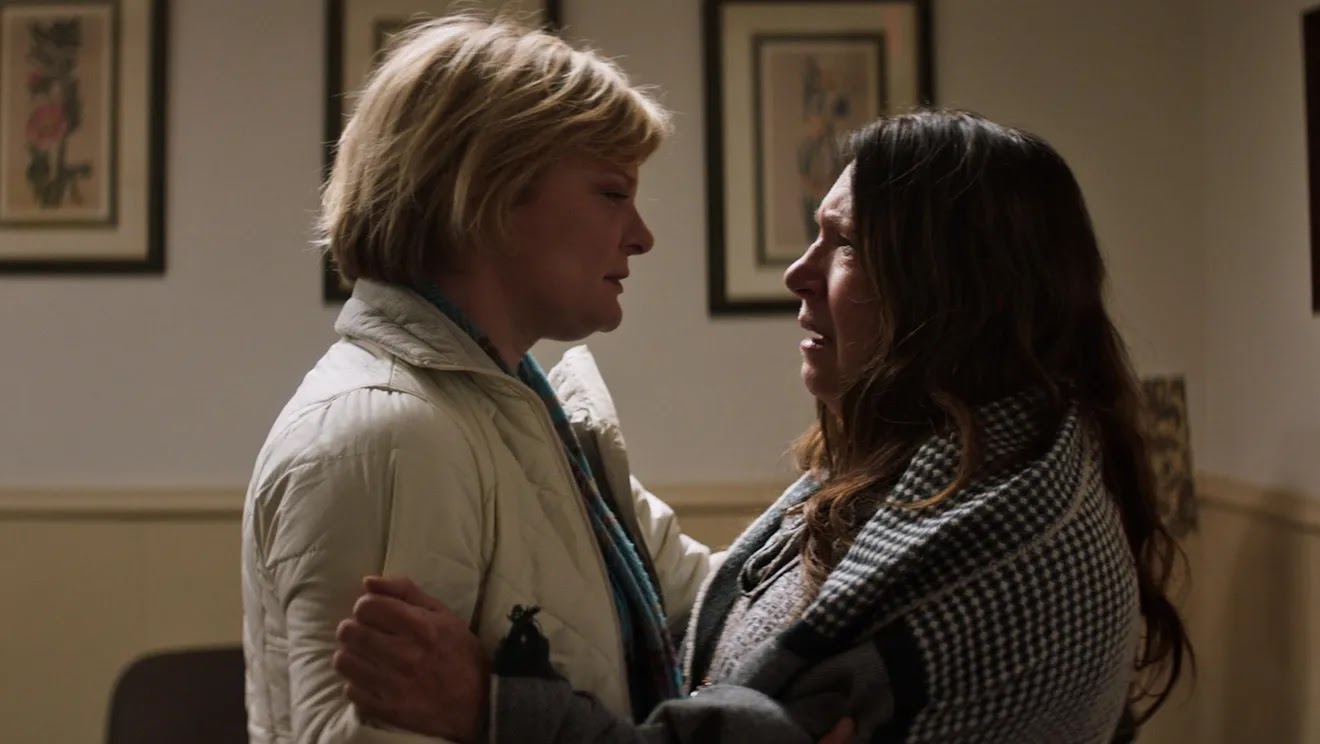Starring: Martha Plimpton, Ann Dowd, Jason Isaacs and Reed Birney
Written and Directed by: Fran Kranz
Rated: PG-13
Running Time: 1hr 51mins
WINNER – Film Independent Spirit Awards – Robert Altman Award
NOMINEE – Film Independent Spirit Awards – Best First Screenplay (Fran Kranz)
WINNER – Hollywood Critics Association – Best Best Independent Film, Best First Feture (Fran Kranz), Best Supporting Actor (Jason Isaacs), Best Original Screenplay (Fran Kranz)
NOMINEE – BFTA Awards – Best Supporting Actress (Ann Dowd)
NOMINEE – Academy of Science Fiction, Horror & Horror Films – Saturn Award – Best Independent Film
NOMINEE – Critics Choice Awards – Best Supporting Actress (Ann Dowd)
“I tried to treat the conversation as if these were four equal parties and four equal human beings, who are real human beings. There was no good or bad. There was no antagonist or protagonist. There was an equivalence. I wanted their humanity and I wanted them to have dignity. I think that was important from the very first step. I wasn’t trying to say, “This person’s at fault. This person did this thing and these characters are going to find it out, so that they can blame them.” It’s about the complexity of being a human being and the tragic mistakes we make or the things we miss because we love unconditionally. Because we love our children so much, we make mistakes. That felt truthful.” Director Fran Kranz – Collider

At first, the basic theme of the movie MASS may sound very familiar. It’s about people dealing with the aftermath of a tragic event and how we as humans learn to find the emotions within ourselves to get through it. As the film moves forward, though, it becomes obvious that it’s about so much more. It also analyzes one’s understanding of the others involved in the situation, no matter which side of the tragedy they may be on. We as people spend so much time thinking about how to get over something tragic so we ourselves can move forward that we tend to forget that others are dealing with their own inner demons as well, especially when they are on the other side of the situation. With MASS, writer/director Fran Kranz chose to explore the different sides of a tragedy by taking all of the film’s characters to some deeply emotional places of loss and understanding. With its incredible performances, intelligent script and unique directing style, the film is a genuinely emotional experience with an ending encounter that will leave viewers thinking about the film long after the credits roll.
On the surface, the story is simple. It takes place in the basement of a church, years after a school shooting. The parents of the teen responsible meet up to talk with the parents of one of the students he killed. They all hope to be able to find a way to finally move on from the terrible emotions that they each feel and that have been controlling their lives since that horrible day. It’s a movie that at first feels like a simple journey to self-discovery and healing before then venturing into more complicated themes of forgiveness and understanding. It’s a story that explores emotional pain, sadness, anger and resentment in a very real manner.

MASS is the kind of film that could have very easily been made into a sappy manipulation of emotions. It could’ve become an excuse to make the audience feel sorry for the parents of the child who was killed while villainizing those of the shooter. Instead, first-time writer/director Kranz realizes that there are two sides to every story and has decided to examine the inner emotions of both sets of parents equally. There are no heroes and villains here, only four people who have gone through something tragic and are trying their best to heal. As one set of parents listens to the other, there are moments when everyone begins to realize that not everything is as obvious as they first thought. There are moments of anger and sorrow and then, there are moments of clarification and understanding. Both sets of parents are forced to reveal emotions and thoughts that they have kept buried inside themselves for a very long time.
The writing is first-rate, and the dialogue is more intelligent than obvious. Nothing spoken by these four participants ever feels contrived and what they have to say and question never feels written for the sole purpose of allowing the filmmakers to make a point. Everything feels true to life and genuine, making the experience of watching the conversation taking place both devastating and emotional. This is a movie that doesn’t get political about gun rights while also never trying to come to any conclusions as to what caused the shooter to commit such a violent act. It is about the resulting aftermath, most specifically the emotions that have ruined these four people’s lives, and what the best way to move forward with life is.
The film’s main success comes from the strength of the performances from Martha Plimpton, Jason Issacs, Ann Dowd and Reed Birney, who play the four parents. Each actor successfully plays their parts with some real sympathy and compassion while also individualizing their characters with the different kinds of emotions that have brought them to this same place of devastating grief. Each actor is given time to shine, but the attention is never placed on one character alone. Fortunately, Kranz and his editor, Yang Hua Hu, constructed the arrangement of shots to work very differently than viewers have seen in the past. As one character reaches their emotional peak, speaking of their feelings towards what happened and how it still affects them, Kranz and Hu don’t linger on them for too long. There is an importance placed on the reactions of the other characters as the editing cuts to them in order to concentrate on the silent moments of understanding that they begin to feel towards what is being said. This adds an emotional depth to both the individual moments as well as the film as a whole. The acting in these shots is mostly silent, and all four actors effectively convey the feelings of their characters without ever getting overly dramatic and always staying true to the sensitive reality of the situation.

The shining performance comes from Plimpton as Gail, the mother of the boy who is killed by the shooter. In one of the best performances of her career (right up there with her performance in the underexposed cinematic treasure RUNNING ON EMPTY), she effectively conveys feelings of grief and anger in a very contained manner that feels both sympathetic and genuine. When we first meet her, Plimpton portrays Gail’s buried rage so effectively that you can feel her pain just by the way she uses her face and her moments of realization as she begins to gain the strength to come to her final conclusions regarding the other parents and their son make up some of the most effective moments in the film.
Plimpton’s performance is matched by that of Anne Dowd, who plays Linda, the mother of the shooter. Because her son is the one who pulled the trigger, she has the job of playing a character who finds herself defending her son as a person, even though she cannot make sense of his ultimate actions. Linda and her husband both have no real understanding of what happened to cause their son to commit such a horrible act but still realize that he was their child and they loved him as only a parent can. They question things like whether they could have handled certain situations differently… Did they not know their child as well as they thought.. are they partially to blame? Dowd is especially good at conveying the conflicting feelings Linda has hidden deep down inside and she does an excellent job of revealing the emotions that have taken over Linda’s soul. There is a moment at the end of the film between Dowd and Plimpton that will make you wonder why it is that these two actresses didn’t take home all the acting awards that year.
MASS isn’t the kind of movie that you enjoy as much as experience. Emotionally draining, it is filled with the need to speak the truth of the moment. When a tragedy like a school shooting is reported on the news, a lot of us immediately jump to our own conclusions. A movie like MASS is important because it causes the viewer to reevaluate these thoughts and maybe even change the way we think in the future.
Watch MASS
You May Also Like
